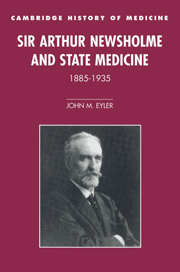Book contents
- Frontmatter
- Contents
- Illustrations
- Preface
- Abbreviations
- PART I THE MEDICAL OFFICER OF HEALTH AND THE LOCAL SANITARY AUTHORITY
- PART II NEWSHOLME AT THE LOCAL GOVERNMENT BOARD
- 7 Poverty, fitness, and the Poor Law
- 8 The Local Government Board and the nation's health policy
- 9 Launching a national tuberculosis program
- 10 The Great War and the public health enterprise
- 11 Infant and maternal mortality, interdepartmental conflict, and Newsholme supplanted
- PART III THE OLD WORLD AND THE NEW: NEWSHOLME AS ELDER STATESMAN
- Select bibliography
- Index
- Titles in the series
8 - The Local Government Board and the nation's health policy
Published online by Cambridge University Press: 04 December 2009
- Frontmatter
- Contents
- Illustrations
- Preface
- Abbreviations
- PART I THE MEDICAL OFFICER OF HEALTH AND THE LOCAL SANITARY AUTHORITY
- PART II NEWSHOLME AT THE LOCAL GOVERNMENT BOARD
- 7 Poverty, fitness, and the Poor Law
- 8 The Local Government Board and the nation's health policy
- 9 Launching a national tuberculosis program
- 10 The Great War and the public health enterprise
- 11 Infant and maternal mortality, interdepartmental conflict, and Newsholme supplanted
- PART III THE OLD WORLD AND THE NEW: NEWSHOLME AS ELDER STATESMAN
- Select bibliography
- Index
- Titles in the series
Summary
THE MEDICAL OFFICER OF THE L.G.B.
John Burns offered Arthur Newsholme the position of Medical Officer of the Local Government Board on January 11, 1908, and Newsholme arranged to take up his duties in Whitehall on February 4, one day after testifying before the Royal Commission on the Poor Laws. He became the Board's sixth Medical Officer in a line stretching back to Sir John Simon. In making this move, Newsholme went to the nation's central health and social welfare authority, to a bureau with important responsibilities in areas where major social reforms were presently under political consideration. The appointment was a great opportunity for a reformminded Medical Officer. However, its organization, tradition, and leadership made the L.G.B. a very unlikely engine of reform.
Writing in 1936, R.C.K. Ensor sounded the tone which historians have followed for two generations in describing the L.G.B.
Set up to guard against extravagance in the granting of poor relief, it had imbued its officials with the idea that Whitehall's sole duty towards local authorities was to prevent them from doing what they ought not. But at this time what the local authorities … really needed from the centre was positive stimulus, enlightened guidance, and constructive advice based on research… It is difficult to over-estimate what the country lost through having its local authorities down to 1914 placed under a central department constantly on the alert to hinder them and rarely, if ever, to help.
- Type
- Chapter
- Information
- Sir Arthur Newsholme and State Medicine, 1885–1935 , pp. 220 - 238Publisher: Cambridge University PressPrint publication year: 1997



